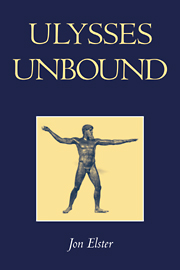II - Ulysses Unbound: Constitutions as Constraints
Published online by Cambridge University Press: 07 December 2009
Summary
INTRODUCTION
Many writers have argued that political constitutions are devices for precommitment or self-binding, created by the body politic in order to protect itself against its own predictable tendency to make unwise decisions. In an early discussion of the problem, Spinoza made an explicit analogy between individual and political precommitment:
[It] is by no means contrary to practice for laws to be so firmly established that even the king himself cannot repeal them. The Persians, for example, used to worship their kings as gods, yet even their kings had no power to repeal laws that had once been established, as is clear from Daniel Chapter 6, and nowhere, as far as I know, is a king appointed unconditionally, without any explicit terms. This, in fact, is contrary neither to reason nor to the absolute obedience due to a king; for the fundamental laws of the state must be regarded as the king's permanent decrees, so that his ministers render him complete obedience in refusing to execute any command of his which contravenes them. We may clarify this point by reference to Ulysses, whose comrades did execute his command in refusing, in spite of all his orders and threats, to untie him from his ship's mast while he was enchanted by the Siren's song: and it is put down to his good sense that he thanked them afterwards for carrying out his original intention so obediently. Even kings have followed the example of Ulysses; they usually instruct their judges to have no respect for persons in administering justice, not even the king himself, if by some odd mischance he commands something which they know to contravene established laws. […]
- Type
- Chapter
- Information
- Ulysses UnboundStudies in Rationality, Precommitment, and Constraints, pp. 88 - 174Publisher: Cambridge University PressPrint publication year: 2000
- 2
- Cited by

